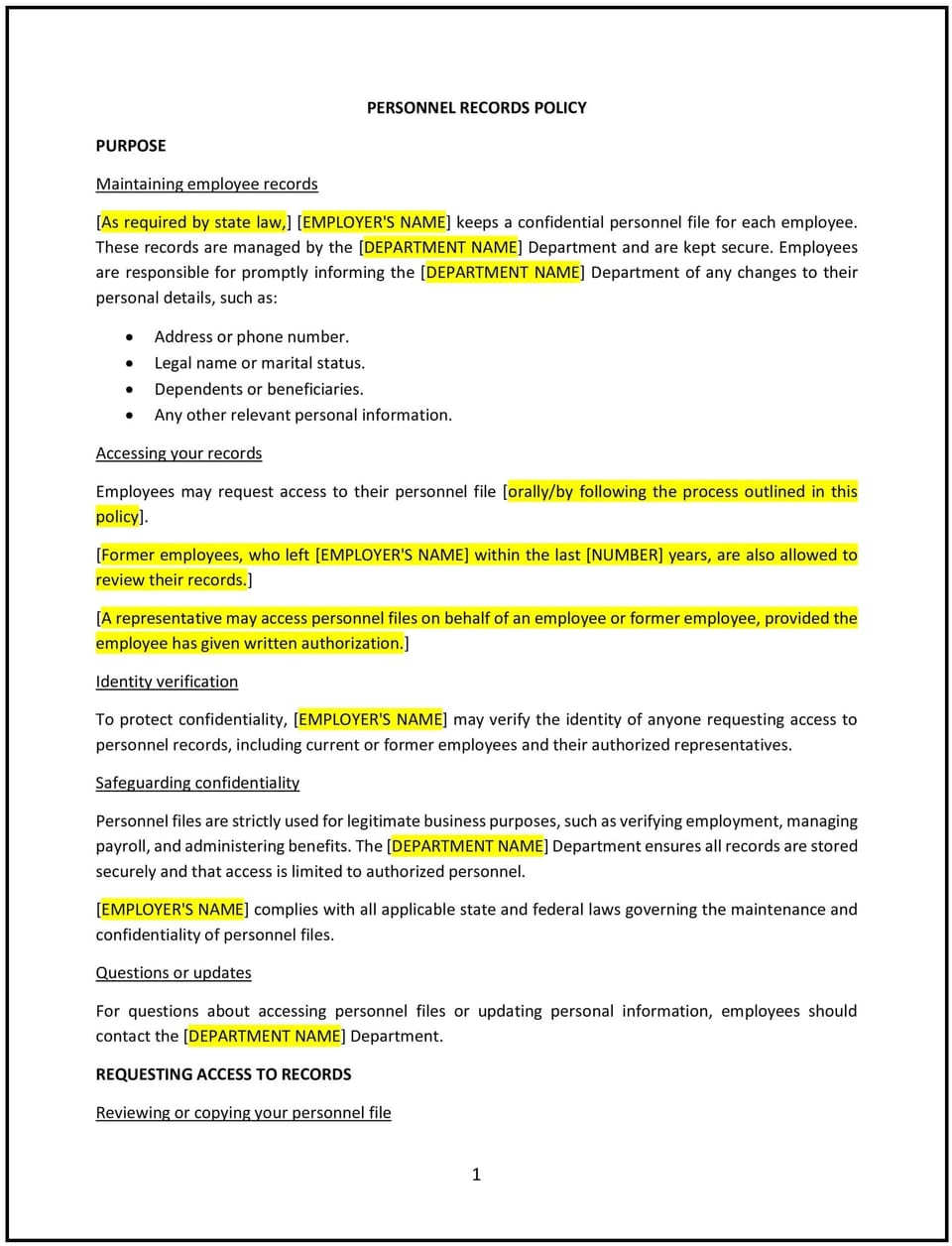Personnel records policy (Hawaii): Free template

Personnel records policy (Hawaiʻi)
A personnel records policy helps Hawaiʻi businesses establish guidelines for managing and protecting employee records, such as employment applications, performance reviews, payroll information, and disciplinary actions. This policy outlines procedures for collecting, storing, and accessing personnel records, while addressing Hawaiʻi’s unique cultural and legal considerations. It is designed to ensure accuracy, confidentiality, and support compliance with state and federal laws.
By implementing this policy, businesses in Hawaiʻi can protect sensitive employee information, maintain organized records, and demonstrate a commitment to transparency and accountability.
How to use this personnel records policy (Hawaiʻi)
- Define personnel records: Clearly outline what constitutes personnel records, such as employment applications, payroll data, performance evaluations, and disciplinary records.
- Establish collection procedures: Specify how personnel records are collected, ensuring accuracy and compliance with applicable laws.
- Implement storage and security measures: Provide guidelines for storing personnel records securely, such as using locked filing cabinets or encrypted digital systems.
- Address access and confidentiality: Outline who can access personnel records, under what circumstances, and how confidentiality will be maintained.
- Set retention periods: Define how long personnel records should be retained, in alignment with Hawaiʻi state laws and federal regulations.
- Communicate the policy: Share the policy with employees during onboarding and through internal communications to ensure awareness and understanding.
- Train employees and managers: Educate staff on the policy’s guidelines, including how to handle personnel records securely and recognize potential risks.
- Monitor compliance: Regularly review record-keeping practices to ensure adherence to the policy and address any issues promptly.
- Review and update the policy: Regularly assess the policy’s effectiveness and make adjustments as needed to reflect changes in laws, technology, or business needs.
Benefits of using this personnel records policy (Hawaiʻi)
This policy offers several advantages for Hawaiʻi businesses:
- Protects sensitive information: Clear guidelines help prevent unauthorized access, breaches, or misuse of personnel records.
- Ensures accuracy: Structured procedures for collecting and maintaining records ensure data is accurate and up-to-date.
- Enhances transparency: Employees understand how their records are managed and who has access to them, fostering trust and accountability.
- Supports compliance: The policy helps businesses comply with Hawaiʻi state laws and federal regulations, such as the Fair Labor Standards Act (FLSA) and the Equal Employment Opportunity Commission (EEOC) guidelines.
- Encourages accountability: Employees and managers understand their responsibilities for handling personnel records securely and responsibly.
- Improves efficiency: Organized and secure record-keeping simplifies audits, reporting, and decision-making processes.
- Builds trust: A clear and transparent policy demonstrates the business’s commitment to protecting employee privacy and maintaining accurate records.
Tips for using this personnel records policy (Hawaiʻi)
- Communicate the policy effectively: Share the policy with employees during onboarding and through regular reminders, such as emails or training sessions.
- Provide training: Educate staff on the policy’s guidelines, including how to handle personnel records securely and recognize potential risks.
- Use technology: Implement secure record-keeping systems, such as encrypted databases or cloud storage, to protect personnel records.
- Monitor compliance: Regularly review record-keeping practices to ensure adherence to the policy and address any issues promptly.
- Be transparent: Clearly explain the policy’s purpose, benefits, and expectations to employees to build trust and cooperation.
- Review the policy periodically: Update the policy as needed to reflect changes in laws, technology, or business needs.
Q: Why should Hawaiʻi businesses adopt a personnel records policy?
A: Businesses should adopt this policy to protect sensitive employee information, maintain organized records, and comply with state and federal laws.
Q: What types of records are considered personnel records?
A: Personnel records may include employment applications, payroll data, performance evaluations, disciplinary records, and other employee-related documents.
Q: How should businesses store personnel records securely?
A: Businesses should use secure storage methods, such as locked filing cabinets for physical records or encrypted digital systems for electronic records.
Q: Who can access personnel records?
A: Access should be limited to authorized personnel, such as HR staff or managers, and only for legitimate business purposes.
Q: How long should businesses retain personnel records?
A: Retention periods should align with Hawaiʻi state laws and federal regulations, typically ranging from one to seven years depending on the type of record.
Q: What training should businesses provide to employees?
A: Businesses should educate staff on how to handle personnel records securely, recognize potential risks, and follow the policy’s guidelines.
Q: How often should the policy be reviewed?
A: The policy should be reviewed annually or as needed to reflect changes in laws, technology, or business needs.
This article contains general legal information and does not contain legal advice. Cobrief is not a law firm or a substitute for an attorney or law firm. The law is complex and changes often. For legal advice, please ask a lawyer.


